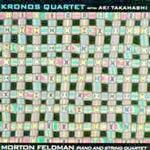
MARBECKS COLLECTABLE: Feldman: Piano and String Quartet
 $30.00
Low Stock
add to cart
$30.00
Low Stock
add to cart
MORTON FELDMAN
MARBECKS COLLECTABLE: Feldman: Piano and String Quartet
Kronos Quartet, with Aki Takahashi (Piano)
[ Nonesuch Records / CD ]
Release Date: Friday 24 September 1993
"The Feldman experience par excellence."
Gramophone Feb 1994
"Lasting just under 80 minutes, the Piano Quintet is-for late Feldman-a medium-length piece, exquisitely imagined through these instruments and changing its routines just enough to avoid monotony. Feldman liked quiet sounds to seem sourceless and would have agreed with Ad Reinhardt, the abstract painter, who wanted "art as art and as nothing else... purer and emptier, more absolute and more exclusive".
The auditory scenario of the Piano Quintet is simple. A rising piano figure leaves sustained sounds hanging in the strings: the gesture is consistent, but the details continually vary. This is what the listener hangs on to and it remains absorbing.
Feldman studied with a pupil of Scriabin, which still shows two years before his death-notice chords such as those at 1'35" and 3'20". Occasionally the piano is left on its own, such as from 9'11" to 10'09" or again at 25'10" and 27'10". Octaves in the piano's normally dissonant chords are a surprise at 25'25", 25'43" and 26'01".
In Feldman's carefully established, mesmeric processional context, the monody in harmonics at 36'40" and the pizzicato monody at 40'50" are major landmarks, like the melody he wrote when he was 15, which emerges near the end of Rothko Chapel. At around 45'00" the piano contributes some single notes to joint sonorities as the string quartet settles down to an oscillating see-saw between two chords. Feldman saw his late pieces as representing an evolving process and this comes across as a microscopic scrutiny of the relation between piano and strings. The piano's rising figures get much slower towards the end: finally, it is the piano that has the last few wisps of sound.
It may seem that stasis has set in after about an hour with little new action. But the elements are still changing, less ruthlessly static than in the slowest passages of Cage's First String Quartet. This seems an ideal interpretation, easy to live with and in exactly the right recorded ambience. The Feldman experience par excellence."
Gramophone Feb 1994